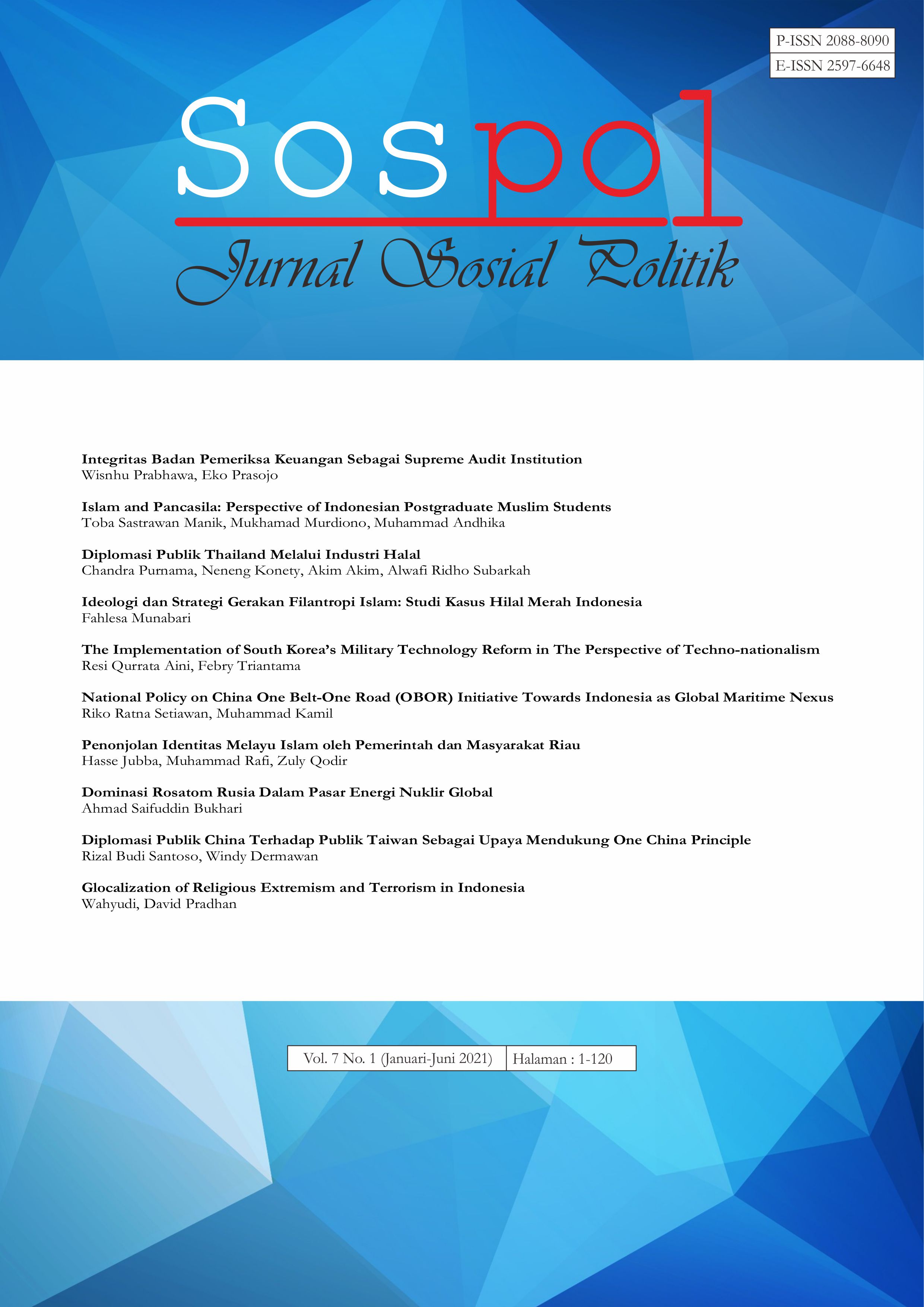Ideologi dan Strategi Gerakan Filantropi Islam: Studi Kasus Hilal Merah Indonesia
DOI:
https://doi.org/10.22219/sospol.v7i1.14821Keywords:
Indonesian Red Crescent, Islamic Movements, Social Work, Islamic Philantrophy, Islamic CharityAbstract
This article discusses the emergence, activities, and the ways in which Hilal Merah Indonesia (HILMI) mobilizes its resources. HILMI is the autonomous philanthropic division of Front Pembela Islam (FPI) whose activities are focused on delivering humanitarian assistance to beneficiaries ranging from those suffering from natural disasters to those living in severe poverty. A growing body of literature has investigated faith-based organizations that provide humanitarian services in Indonesia such as Dompet Dhuafa, Muhammadiyah (Lazismu), as well as Nahdlatul Ulama’s (Lazisnu). However, little attention has been paid to the social and humanitarian activities of Islamic radical movements in the country, such as the FPI. This article aims to address this literature gap. It used a case study approach to obtain primary data as well as a comprehensive understanding of HILMI. The primary data collection was carried out through field observations which were mostly carried out at the HILMI secretariat office in the Kalibata area, South Jakarta, DKI Jakarta. Interviews were conducted with key HILMI informants and a number of FPI officials. This study also used secondary data such as scholarly literature and news articles. The article opens up with the genesis and resource mobilization strategy of FPI. Through the lens of social movement theory, it then analyzes the emergence and resource mobilization strategy of HILMI. It demonstrates how the informal, loose, and flexible structure and culture of its parent organization, FPI, is reflected in the ways in which HILMI engages in the provision of humanitarian assistance in the country.
Downloads
References
Adair-Toteff, C. (2005). Max Weber’s Charisma. Journal of Classical Sociology, 5(2), 189–204.
Ahnaf, M. I. (2009). Between Revolution and Reform: The Future of Hizbut Tahrir Indonesia. Dynamics of Asymmetric Conflict, 2(2), 69–85.
Bagir, Z. A., Cholil, S., Saputro, E., Asyhari, B., Rahayu, M., Tamu, P., & Dwipayana, A. A. G. N. A. (2010). Laporan tahunan kehidupan beragama di Indonesia 2010. Annual Report of Religious Life in Indonesia.
Baidhawy, Z. (2015). Lazismu and Remaking the Muhammadiyah’s New Way of Philanthropy. Al-Jami’ah: Journal of Islamic Studies, 53(2), 387–412.
CNN Indonesia. (2012, December 27). FPI Demo Kedubes China Terkait Uighur Hari Ini. FPI Demo Kedubes China Terkait Uighur Hari Ini. https://www.cnnindonesia.com/nasional/20191227075706-20-460234/fpi-demo-kedubes-china-terkait-uighur-hari-ini
CNN Indonesia. (2017, December 15). Maklumat FPI: Warga Wajib Ikut Aksi Bela Palestina di Monas. https://www.cnnindonesia.com/nasional/20171215153350-20-262681/maklumat-fpi-warga-wajib-ikut-aksi-bela-palestina-di-monas
Detikcom. (2017, December 22). Situs dan Akun Medsosnya Bolak-balik Diblokir, FPI Melawan. https://news.detik.com/berita/d-3781763/situs-dan-akun-medsosnya-bolak-balik-diblokir-fpi-melawan
Dhofier, Z. (1980). The Pesantren Tradition: A Study of the Role of the Kyai in the Maintenance of the Traditional Ideology of Islam in Java.
Diani, M., & Della Porta, D. (1999). Social Movements: An Introduction. Blackwell Publishing Limited.
Esposito, J. L., & Voll, J. O. (2001). Makers of contemporary Islam. Oxford University Press, USA.
Fauzia, A. (2017). Penolong kesengsaraan umum: The charitable activism of muhammadiyah during the colonial period. South East Asia Research, 25(4), 379–394.
Hasan, A. M. (2018, January 24). Jejak Aksi-Aksi Tolak FPI di Berbagai Daerah. Tirto. https://tirto.id/jejak-aksi-aksi-tolak-fpi-di-berbagai-daerah-cDGT
Helmanita, K. (2006). Managing Islamic philanthropy with modern management: the experiences of Dompet Dhuafa. Islamic Philanthropy and Social Development in Contemporary Indonesia, 85–118.
Hidayatullah. (2018, May 22). Ramadhan, HILMI-FPI Salurkan Bantuan Tahap IV untuk Rohingya di Myanmar. https://www.hidayatullah.com/ramadhan/syiar-ramadhan/read/2018/05/22/142906/ramadhan-hilmi-fpi-salurkan-bantuan-tahap-iv-untuk-rohingya-di-myanmar.html
Jahroni, J. (2008). Defending the Majesty of Islam: Indonesia’s Front Pembela Islam, 1998-2003. Silkworm Books.
Latief, H. (2010). Health Provision for the Poor Islamic Aid and the Rise of Charitable Clinics in Indonesia. South East Asia Research, 18(3), 503–553.
Liddle, R. W. (1996). The Islamic Turn in Indonesia: a Political Explanation. Journal of Asian Studies, 613–634.
McAdam, D., McCarthy, J. D., & Zald, M. N. (1996). Introduction: Opportunities. Mobilizing Structures, and Framing Processes-Toward a Synthetic, Comparative Perspective on Social Movements.
McCarthy, J. D., & Zald, M. N. (1977). Resource Mobilization and Social Movements: A Partial Theory. American Journal of Sociology, 82(6), 1212–1241.
Meyer, D. S., & Minkoff, D. C. (2004). Conceptualizing Political Opportunity. Social Forces, 82(4), 1457–1492.
Munabari, F. (2010). Hizbut Tahrir Indonesia: The Rhetorical Struggle for Survival. In A. Ota, Atsushi, Masaaki, Okamoto, Suaedy (Ed.), Islam in Contention: Rethinking Islam and State in Indonesia (pp. 173–217). CSEAS Kyoto University, CAPAS Taiwan National University, The Wahid Institute.
Munabari, F. (2017). Reconciling Sharia with “Negara Kesatuan Republik Indonesia”: The Ideology and Framing Strategies of the Indonesian Forum of Islamic Society (FUI). International Area Studies Review, 20(3), 242–263.
Munabari, F. (2018). The Quest for Sharia in Indonesia: The Mobilization Strategy of the Forum of Islamic society. Contemporary Islam, 12(3), 229–249.
Munabari, F. (2019). Mendamaikan Syariah & NKRI: Strategi Mobilisasi dan Retorika Gerakan Islam Revivalis Forum Umat Islam (FUI). Rajawali Press.
Munabari, F., Larasati, N. U., Ihsan, R., & Nurhadiyanto, L. (2020). Islamic Revivalism in Indonesia: The Caliphate, Sharia, NKRI, Democracy, and the Nation-State. Jurnal Politik, 5(2), 281–312.
Nisa, E. F. (2018). Social Media and the Birth of an Islamic Social Movement: ODOJ (One Day One Juz) in Contemporary Indonesia. Indonesia and the Malay World, 46(134), 24–43.
Nurdin, M. R. (2015). Disaster “Caliphatization”: Hizbut Tahrir Indonesia, Islamic Aceh, and the Indian Ocean Tsunami. International Journal of Mass Emergencies & Disasters, 33(1).
Rahmat, M. I. (2005). Arus Baru Islam Radikal: Transmisi Revivalisme Islam Timur Tengah ke Indonesia. Erlangga.
Republika. (2018, October 3). Relawan FPI Hingga Kenangan Evakuasi Mayat Tsunami Aceh. https://www.republika.co.id/berita/pfz2ty385/relawan-fpi-hingga-kenangan-evakuasi-mayat-tsunami-aceh
Sakai, M. (2012). Building a Partnership for Social Service Delivery in Indonesia: State and Faith‐Based Organisations. Australian Journal of Social Issues, 47(3), 373–388.
Sakai, M. (2010). Growing Together in Partnership: Women’s Views of the Business Practices of an Islamic Savings and Credit Cooperative (Baitul Maal wat Tamwil) in Central Java, Indonesia. Women’s Studies International Forum, 33(4), 412–421.
Slama, M. (2014). Indonesian Hadhramis and the Hadhramaut: An Old Diaspora and Its New Connections. Antropologi Indonesia.
Suprana, J. (2014). Bersama Ketua Umum FPI Rizieq Shihab. TVRI.
Tarrow, S. (1998). Power in Movement: Social Movements and Contentious Politics. Cambridge: Cambridge University Press. DOI: Https://Doi. Org/10.1017/Cbo9780511813245.
Telford, J., & Cosgrave, J. (2007). The International Humanitarian System and the 2004 Indian Ocean Earthquake and Tsunamis. Disasters, 31(1), 1–28.
Tilly, C. (2004). Tilly, Charles (2004). Social movement: 1768–2004. Paradigm Publishers.
Woodward, M., Yahya, M., Rohmaniyah, I., Coleman, D. M., Lundry, C., & Amin, A. (2014). The Islamic Defenders Front: Demonization, Violence and the State in Indonesia. Contemporary Islam, 8(2), 153–171.
Zald, M. N., & McCarthy, J. D. (1987). Social Movements in an Organizational Society: Collected Essays. Transaction Publishers.
Wawancara
Al-Hamid, Ali. (2020). (Ketua DPP HILMI). Jakarta, 20 April 2018.
Bamu’min, Novel (2013). (Sekretaris Dewan Pengurus Wilayah FPI DKI Jakarta). Jakarta, 1 Juni 2013.
Maarif, Slamet (2013). (Wakil Sekjen DPP FPI). Jakarta, 13 November 2013.
Purnomo, Eko (2018). (Koordinator Lapangan DPP HILMI). Jakarta, 6 April 2018.
Sahroji, Muhammad (2013). (Kepala Sekretariat DPP FPI). Jakarta, 7 September 2013.
Shodiq, Jafar (2013). (Wakil Sekretaris Jenderal Dewan Pengurus Pusat FPI). Jakarta, 5 Juni 2013.
Downloads
Published
How to Cite
Issue
Section
License
Copyright (c) 2021 Fahlesa Munabari

This work is licensed under a Creative Commons Attribution-NonCommercial-ShareAlike 4.0 International License.
Authors who publish with this journal agree to the following terms:
- Authors retain copyright and grant the journal right of first publication with the work simultaneously licensed under a Creative Commons Attribution-ShareAlike 4.0 International License that allows others to share the work with an acknowledgement of the work's authorship and initial publication in this journal.
- Authors are able to enter into separate, additional contractual arrangements for the non-exclusive distribution of the journal's published version of the work (e.g., post it to an institutional repository or publish it in a book), with an acknowledgement of its initial publication in this journal.
- Authors are permitted and encouraged to post their work online (e.g., in institutional repositories or on their website) prior to and during the submission process, as it can lead to productive exchanges, as well as earlier and greater citation of published work (See The Effect of Open Access).

This work is licensed under a Creative Commons Attribution-ShareAlike 4.0 International License.



















